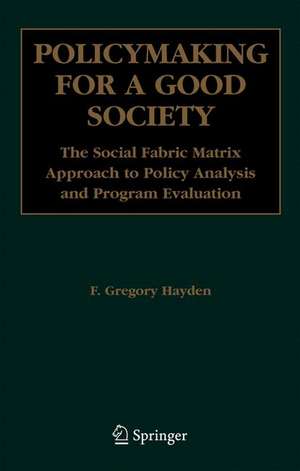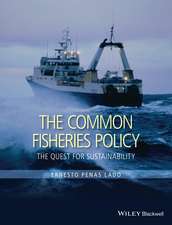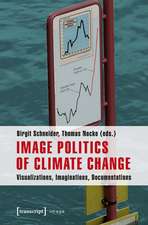Policymaking for a Good Society: The Social Fabric Matrix Approach to Policy Analysis and Program Evaluation
Autor F. Gregory Haydenen Limba Engleză Hardback – 16 noi 2005
| Toate formatele și edițiile | Preț | Express |
|---|---|---|
| Paperback (1) | 1106.63 lei 6-8 săpt. | |
| Springer Us – 29 oct 2010 | 1106.63 lei 6-8 săpt. | |
| Hardback (1) | 1112.78 lei 6-8 săpt. | |
| Springer Us – 16 noi 2005 | 1112.78 lei 6-8 săpt. |
Preț: 1112.78 lei
Preț vechi: 1357.05 lei
-18% Nou
Puncte Express: 1669
Preț estimativ în valută:
212.95€ • 221.07$ • 177.57£
212.95€ • 221.07$ • 177.57£
Carte tipărită la comandă
Livrare economică 22 martie-05 aprilie
Preluare comenzi: 021 569.72.76
Specificații
ISBN-13: 9780387293691
ISBN-10: 0387293698
Pagini: 272
Ilustrații: XVI, 252 p.
Dimensiuni: 156 x 235 x 20 mm
Greutate: 0.56 kg
Ediția:2006
Editura: Springer Us
Colecția Springer
Locul publicării:New York, NY, United States
ISBN-10: 0387293698
Pagini: 272
Ilustrații: XVI, 252 p.
Dimensiuni: 156 x 235 x 20 mm
Greutate: 0.56 kg
Ediția:2006
Editura: Springer Us
Colecția Springer
Locul publicării:New York, NY, United States
Public țintă
Professional/practitionerCuprins
Policy Paradigms should be Consistent with the Complexity of Reality.- Instrumental Philosophy and Criteria.- General Systems Principles for Policy Analysis.- Social Criteria and Socioecological Indicators.- The Social Fabric Matrix.- Illustrations of the Social Fabric Matrix.- Timeliness as the Appropriate Concept of Time.- Evaluation for Sufficiency: Combining the Social Fabric Matrix and Instrumentalism.- The Social Fabric Matrix in a Metapolicymaking Context.
Textul de pe ultima copertă
This book was written for students of policy science and analysts with policy making responsibilities who want to understand how to solve social and ecological problems with an integrated systems approach. It describes a method that gives analysts the ability to combine knowledge of social, technological, and ecological systems in order to model real-world complexities that will lead to desirable outcomes.
The author had designed a unique methodology – the social fabric matrix (SFM) – that encourages relevant questions; defines and models a whole that transcends system components and describes their relationship; includes cultural values, social beliefs, and institutional rules; identifies system feedback loops; guides the development of social indicators and builds a database for statistical analysis; coordinates temporal sequences; compares the consequences of alternative policies; and includes the ability to relate research to the broader reality of political action such a lobbying, budgetary processes, and administrative implementation.
F. Gregory Hayden teaches economics at the University of Nebraska.
The author had designed a unique methodology – the social fabric matrix (SFM) – that encourages relevant questions; defines and models a whole that transcends system components and describes their relationship; includes cultural values, social beliefs, and institutional rules; identifies system feedback loops; guides the development of social indicators and builds a database for statistical analysis; coordinates temporal sequences; compares the consequences of alternative policies; and includes the ability to relate research to the broader reality of political action such a lobbying, budgetary processes, and administrative implementation.
F. Gregory Hayden teaches economics at the University of Nebraska.
Caracteristici
First book to utilize framework recommended by institutional economists Approaches public policy analysis by integrating social science ideas about beliefs and values with hard scientific knowledge Teaches Social Fabric Matrix (SFM) approach, which integrates context, criteria, and consequences Unlike most competitors, this book teaches how to complete relevant analysis Builds on "Instrumental" approach (pioneered by Oliver Wendell Holmes, William James, Charles S. Pierce, and John Dewey) that was basis of Louis Menand's recent best seller "The Metaphysical Club" International case studies Includes supplementary material: sn.pub/extras















